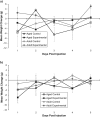Effects of low-dose lipopolysaccharide and age on spatial learning in different Morris water maze protocols
- PMID: 28955440
- PMCID: PMC5607914
- DOI: 10.1177/2050312117729112
Effects of low-dose lipopolysaccharide and age on spatial learning in different Morris water maze protocols
Abstract
Objectives: Animals administered lipopolysaccharide exhibit dose-related sickness behaviors (decreased food intake, weight loss, and cognitive changes). While research has demonstrated that spatial learning is impaired following a lipopolysaccharide immune challenge, the results differ depending on the methodology used to evaluate spatial learning. Additionally, few studies have evaluated the effects of low-dose lipopolysaccharide on spatial learning. Therefore, we assessed spatial learning, food intake, and weight changes in adult and aged rats after a low-dose lipopolysaccharide immune challenge in the Morris water maze using two water temperatures.
Methods: Adult (5-6 months) and aged (22 months) male Brown-Norway rats were administered either 50 or 100 μg/kg lipopolysaccharide or saline, and then tested in the Morris water maze for 5 days, rested for 7 days, and later underwent 2 days of retention tests. Probe trials were conducted at the end of initial and retention testing.
Results: Low-dose lipopolysaccharide administration did not result in food intake or weight changes. While the aged experimental group took longest to improve directional heading error in both cold and warm water, heading error was greater in cold water. Behavioral testing revealed an apparent age and water temperature effect on swim time. Retention and probe trial results showed that aged experimental animals had the worst performance in cold water.
Conclusion: We conclude that while low-dose lipopolysaccharide did not result in typical sickness behaviors (decreased food intake or weight), spatial learning and memory were impaired in the aged experimental group. These results have important implications for the care of elderly individuals experiencing mild to moderate infections.
Keywords: Aging; illness behavior; lipopolysaccharide; maze learning; memory; time factors.
Conflict of interest statement
Declaration of conflicting interests: The author(s) declared no potential conflicts of interest with respect to the research, authorship, and/or publication of this article.
Figures





Similar articles
-
Characterization of Spatial Learning and Sickness Responses in Aging Rats Following Recurrent Lipopolysaccharide Administration.Biol Res Nurs. 2020 Jan;22(1):92-102. doi: 10.1177/1099800419875824. Epub 2019 Oct 10. Biol Res Nurs. 2020. PMID: 31601118
-
Spatial Learning Responses to Lipopolysaccharide in Adult and Aged Rats.Biol Res Nurs. 2018 Jan;20(1):32-39. doi: 10.1177/1099800417726875. Epub 2017 Sep 11. Biol Res Nurs. 2018. PMID: 28891299 Free PMC article.
-
Different Sickness Responses in Adult and Aged Rats Following Lipopolysaccharide Administration.Biol Res Nurs. 2018 May;20(3):335-342. doi: 10.1177/1099800418759599. Epub 2018 Feb 25. Biol Res Nurs. 2018. PMID: 29480031 Free PMC article.
-
Developmental D-methamphetamine treatment selectively induces spatial navigation impairments in reference memory in the Morris water maze while sparing working memory.Synapse. 2003 Jun 1;48(3):138-48. doi: 10.1002/syn.10159. Synapse. 2003. PMID: 12645039
-
Intermittent swim stress causes Morris water maze performance deficits in a massed-learning trial procedure that are exacerbated by reboxetine.Pharmacol Biochem Behav. 2013 Nov 15;113:12-9. doi: 10.1016/j.pbb.2013.09.014. Epub 2013 Oct 9. Pharmacol Biochem Behav. 2013. PMID: 24120767
Cited by
-
Mitochondrial dysfunction precedes hippocampal IL-1β transcription and cognitive impairments after low-dose lipopolysaccharide injection in aged mice.Heliyon. 2024 Mar 30;10(7):e28974. doi: 10.1016/j.heliyon.2024.e28974. eCollection 2024 Apr 15. Heliyon. 2024. PMID: 38596096 Free PMC article.
References
-
- Kelley KW, Bluthe RM, Dantzer R, et al. Cytokine-induced sickness behavior. Brain Behav Immun 2003; 17(Suppl. 1): S112–S118. - PubMed
-
- Kent S, Bluthe RM, Kelley KW, et al. Sickness behavior as a new target for drug development. Trends Pharmacol Sci 1992; 13(1): 24–28. - PubMed
-
- Smith AP. Effects of the common cold on mood, psychomotor performance, the encoding of new information, speed of working memory and semantic processing. Brain Behav Immun 2012; 26(7): 1072–1076. - PubMed
-
- Perry VH, Cunningham C, Holmes C. Systemic infections and inflammation affect chronic neurodegeneration. Nat Rev Immunol 2007; 7(2): 161–167. - PubMed
Grants and funding
LinkOut - more resources
Full Text Sources
Other Literature Sources

